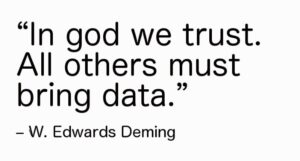In the past year, Generative AI (Gen AI) has taken center-stage in discussions across organizational levels. Its widespread influence on various aspects of our lives has significantly impacted the Digital Transformation Journey of enterprises, ranging from small startups to large incumbents. The adoption of Gen AI has opened new avenues for innovation in products and services, operating models, and overall productivity, to list a few. As organizations experiment with Gen AI use-cases, the Data-Culture of the organization is the differentiator for its meaningful impact and value generation, Data culture poses a substantial barrier to the adoption of Generative AI.
Data Culture is a collective mindset, behaviours, and practices in an organization, it represents treating Data as an asset, as a product. Differentiated by its Quality, Completeness , and Reusability. It considers Data as a First-Class citizen and fundamentally changes the way the entire organization thinks about and acts on Data.
Undoubtedly, any transformation is challenging, and digital transformation is no exception; in fact, it’s even more demanding. Regardless of an organization’s digital maturity level, Gen AI has prompted a re-evaluation and, undoubtedly, a reset of corporate or departmental strategies. The starting point for digital transformation may vary based on factors such as the type of transformation, digital maturity level, leadership sponsorship, and expected outcomes. It is a multifaceted journey that demands clarity, focus, constant communication, and continuous monitoring for calibration and potential pivoting.
In this first part of our series, we emphasize the importance of evolving into a Data-Centric organization with a robust Data Culture. This transformation has never been more critical as Gen AI reshapes both organizational dynamics and customer experiences.

The phrase “In God we trust, all others must bring data,” often attributed to William Edwards Deming, should be the rallying cry for organizations looking to thrive in a data-driven transformation. It underscores the shift towards becoming a data-centric enterprise, where decisions are not based on gut feelings or intuition but grounded in the analysis of accurate, trusted, and timely data.
Connect with us now https://luminatiq.com/contact/ and let’s discuss how we can get started on your Data Centric transformation journey.
The Essence of a Data-Centric Enterprise:
In many organizations today, the ownership of data is often confined to IT departments. While this ensures centralized control, security, and compliance, it results in a siloed approach, distancing key stakeholders from the data-driven decision-making process. This leads to dependencies, conflicts in priorities, the emergence of pseudo-IT teams within businesses, and a proliferation of varied tools, creating department-wise versions of truth. Recognizing the strategic value of data in today’s competitive landscape, the need for a more inclusive approach to data ownership has become evident.
A data-centric enterprise places data at the core of its operations, leveraging it as a strategic asset to drive innovation, enhance decision-making, and gain a competitive edge. This shift is not just about investing in advanced analytics tools or hiring data scientists; it involves fostering a cultural transformation that permeates every level of the organization. Encouraging Co-Ownership, Collaboration and Alignment, in turn, unlocks the full potential of data, enables informed decision-making, and fosters innovation.
Making the Case for Co-Ownership and Data-Centricity
- Business Stakeholders’ Involvement:
Empowering business units with ownership of their relevant applications & data enables a deeper understanding of their specific needs and challenges. Business stakeholders can contribute domain expertise, ensuring that data initiatives align with strategic objectives and operational requirements.
With business stakeholders actively engaged in the data lifecycle, there is a natural emphasis on data quality. Co-ownership ensures that those closest to the business processes are invested in maintaining accurate and reliable data.

- IT Department as Enablers, not Gatekeepers:
While IT departments play a pivotal role in Enterprise Application integration, maintaining data Lifecycle, integrity, security, and infrastructure, their role evolves from gatekeepers to enablers. Collaborative co-ownership acknowledges IT’s expertise while fostering a more inclusive environment where business users actively participate in the data lifecycle. Co-ownership promotes agility by enabling quicker responses to changing business needs.
- Leadership’s Strategic Oversight:
Leadership plays a crucial role in this co-ownership model. By actively engaging in data strategy, executives can ensure that data initiatives align with organizational goals. Leadership oversight facilitates the creation of a shared vision where data becomes a strategic asset that drives innovation and competitive advantage.
A shared data ownership model ensures that data initiatives align with strategic objectives. It facilitates a holistic approach where IT, business, and leadership collaborate to derive maximum value from data.
Getting Started on the Journey to becoming a Data-Centric Enterprise
- Assessment & Readiness
As with any journey, begin with an assessment of the current digital & data assets and strategies. Assess the current tools, infrastructure, and practices across the enterprise. Identify Strengths, Opportunities and Areas of Investments. Understanding current Culture, Skills, Processes, Data Lifecycle and Resource Maturity is crucial in developing a vision and strategy.

- Leadership Investment and Alignment
Leadership engagement is the entire process, executive sponsorship is key in the journey and success of the transition into a Data-Centric Culture. Leaders must set the example by basing their decisions on data, constantly communicating enterprise-wide showcasing the positive outcomes and impact.
- Education and Enablement
Invest in training & up-skilling teams to adapt and adopt a data-centric decision-making mindset. It is crucial to invest in fostering data literacy across the organization, enabling collaboration to break-down data silos.
Building a data culture is a journey that requires strategic planning, continuous reinforcement, and a commitment from every level of the organization.
In the next part of this series, we will delve deeper into the Role of Crucial Role of Leadership this journey, in the series we will also focus on the challenges faced, practical steps and strategies organizations can implement to further their journey towards becoming a data-centric enterprise.
Connect with us now https://luminatiq.com/contact/ and let’s discuss how we can get started on your Data Centric transformation journey.































